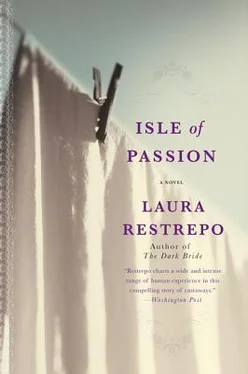Captain Arnaud’s widow is the only white survivor in the group. She is only twenty-nine years old, and, even though she seems older, she still is a beautiful woman, and very intelligent, as her conversation proves. She must be. Otherwise, she would not have been able to help the group through the extreme hardships they were subjected to. Her clothes are very old fashioned but of excellent quality, and she wears some splendid diamonds that speak of more fortunate times. She showed me the money she has accumulated and protected, which she intends to put to good use upon her return. I did not dare confess that even though that money could have represented a fortune in the times of General Huerta, now it is worth almost nothing. Except for her and her children, all of the others are Mexican Indians, but at first I thought they were black, they are so suntanned. Dr. Ross examined them and informed me that he found all in reasonably good health. He told me also that he had talked with the women and learned that when our boat returned to the ship after the failed first landing attempt, they felt so desperate that they thought of killing the children and then committing suicide by drowning in the ocean. The one who seems to have the strongest resolve and a most energetic personality is Tirsa Rendón, widow of the lieutenant at that post. As soon as she came on board, she asked if we would lend her a sewing machine from the quartermaster and without any time to waste, she started to make garments out of some drill material for the children.
The children are very timid, but very curious. Everything seems strange to them, and they want to see and touch everything. They cried when the bluejackets carried them to the gunboat because they thought they would be separated from their mothers, who were still on the boat. The men paid much attention to these children and gave them boxes of candy, although the children had no idea what it was. I spent some time watching a young Indian girl trying to open a box of marshmallows. When she succeeded, she walked to the guardrail, threw the marshmallows in the water one by one, then closed the box and took it with her, satisfied with her new toy. She placed it on the deck, and let it slide back and forth with the movement of the ship. At dinner-time, the younger ones did not want to eat even a bite of anything they were served because, I heard them say, they wanted to eat booby, which is the kind of seagull they used to eat on the isle. The women, on the other hand, said that they hoped not to have to eat more seagulls as long as they lived.
They brought on board two desolate pigs, the scrawniest I have ever seen in my life. The men say they look like the original pair just out of Noah’s ark, and even though they were offered to the cook, no one wants to kill them. It would be cruel for them to lose their lives right after being rescued, after such a hard struggle to survive.
At four in the morning Captain Perril closed his notebook and fell asleep. Two hours later, the radio operator woke him up with the British consul’s reply. He said he would go personally to welcome the survivors and had already notified some of the relatives who had maintained contact with him as part of their rescue efforts.
On Sunday, 21 July, at 1700, the gunboat Yorktown dropped anchor in the Mexican port of Salina Cruz. Three men stood waiting at the dock: the British consul; Alicia’s father, Don Félix Rovira; and the German fellow, Gustav Schultz. Captain Perril ordered the admittance of Don Félix to the cabin where his daughter awaited him. That night he wrote in his diary that he saw them embrace with such emotion that, for the first time in many years, he could not hold back his tears. That they sat together, in silence, looking into each other’s eyes, very moved, and holding hands tightly. Perril also wrote that he left them alone in the cabin, and when he returned, half an hour later, they were still in the same position he had left them, unable to utter a word.

CLIPPERTON CEASED BEING under Mexican authority in 1931 due to a decision favorable to France by King Victor Emmanuel III of Italy. Aside from crabs, boobies, and a French flag, which flies like a faded bedsheet hung out to dry in the sun, the only things standing on the isle are the thirteen coconut palm trees planted by Gustav Schultz.
IN ORIZABA:
Alicia Arnaud (Mrs. Loyo)
IN COLIMA:
Carlos Ceballos
Genaro Hernández
IN MEXICO CITY:
Colonel N.N.
Rodrigo Moya
Carlos Payán
Paco Ignacio Taibo II
Roberto Bardini
IN BOGOTÁ:
Carmen Restrepo
Helena de Restrepo
Guillermo Angulo
Mireya Fonseca
Alvaro Tafur
Ramiro Castro
Gonzalo Mallarino
To Alex Knight, wherever he is.
To Chiqui, wherever he hides.
To the Teacher, in the desert.
To Eduardo Camacho, forever.
To Fernando Restrepo, from afar.
To Dolores M. Koch, for her impeccable translation.

Nina Subin
LAURA RESTREPOis the bestselling author of six novels, including The Dark Bride, A Tale of the Dispossessed , and Delirio , which received Spain’s prestigious Alfaguara Prize in 2004. She lives in Colombia.
Visit www.AuthorTracker.com for exclusive information on your favorite HarperCollins authors.














